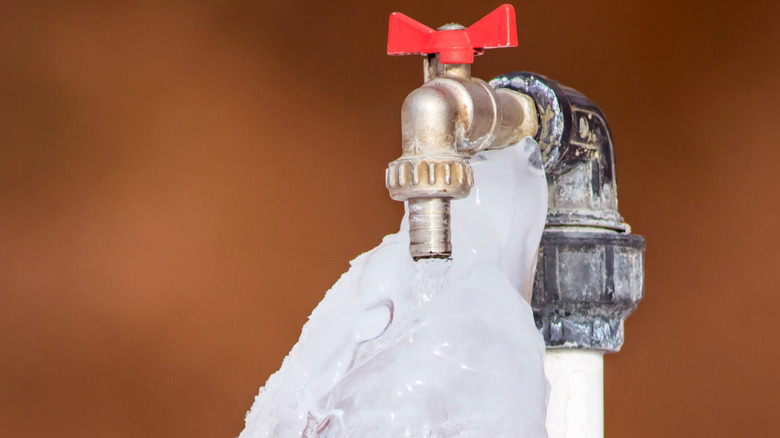Do you find yourself hunting for info around Prevent Frozen Pipes ?

Cold weather can ruin your plumbing, especially by freezing pipelines. Below's how to prevent it from happening and what to do if it does.
Introduction
As temperatures decrease, the risk of frozen pipelines rises, possibly causing expensive repair work and water damage. Recognizing just how to avoid frozen pipelines is critical for house owners in chilly climates.
Avoidance Tips
Insulating at risk pipelines
Wrap pipelines in insulation sleeves or utilize warmth tape to secure them from freezing temperatures. Concentrate on pipes in unheated or exterior areas of the home.
Home heating methods
Maintain indoor rooms properly heated, particularly areas with pipes. Open cupboard doors to enable cozy air to distribute around pipes under sinks.
Exactly how to determine frozen pipelines
Look for lowered water circulation from taps, unusual odors or sounds from pipelines, and noticeable frost on revealed pipes.
Long-Term Solutions
Structural adjustments
Think about rerouting pipelines away from outside wall surfaces or unheated areas. Include added insulation to attics, basements, and crawl spaces.
Updating insulation
Buy premium insulation for pipelines, attic rooms, and walls. Proper insulation assists preserve regular temperature levels and reduces the risk of frozen pipes.
Safeguarding Outside Plumbing
Garden hose pipes and outside faucets
Disconnect and drain garden hoses before winter. Mount frost-proof faucets or cover exterior taps with protected caps.
Comprehending Frozen Pipelines
What creates pipes to freeze?
Pipelines ice up when subjected to temperatures listed below 32 ° F (0 ° C) for prolonged periods. As water inside the pipelines freezes, it expands, taxing the pipe wall surfaces and possibly triggering them to rupture.
Risks and problems
Icy pipes can lead to water supply interruptions, property damage, and expensive repairs. Burst pipes can flooding homes and trigger extensive architectural damages.
Indications of Frozen Piping
Identifying frozen pipelines early can stop them from breaking.
What to Do If Your Pipes Freeze
Immediate actions to take
If you think frozen pipes, keep faucets available to soothe stress as the ice thaws. Make use of a hairdryer or towels taken in warm water to thaw pipelines slowly.
Final thought
Stopping frozen pipes requires aggressive actions and fast reactions. By understanding the causes, indicators, and safety nets, house owners can safeguard their plumbing throughout cold weather.
Helpful Tips to Prevent Frozen Pipes this Winter
UNDERSTANDING THE BASICS: WHY PIPES FREEZE AND WHY IT’S A PROBLEM
Water freezing inside pipes is common during the winter months, but understanding why pipes freeze, and the potential problems it can cause is crucial in preventing such incidents. This section will delve into the basics of why pipes freeze and the associated problems that may arise.
THE SCIENCE BEHIND FROZEN PIPES
When water reaches freezing temperatures, it undergoes a physical transformation and solidifies into ice. This expansion of water as it freezes is the primary reason pipes can burst. As the water inside the pipe freezes, it expands, creating immense pressure on the walls. If the pressure becomes too great, the pipe can crack or rupture, leading to leaks and water damage.
FACTORS THAT CONTRIBUTE TO PIPE FREEZING
Low Temperatures: Extremely cold weather, especially below freezing, increases the risk of pipes freezing. Uninsulated or Poorly Insulated Pipes: Pipes located in unheated areas, such as basements, crawl spaces, or attics, are more prone to freezing. Insufficient insulation or lack of insulation altogether exacerbates the problem. Exterior Wall Exposure: Pipes running along exterior walls are susceptible to freezing as they encounter colder temperatures outside. Lack of Heating or Temperature Regulation: Inadequate heating or inconsistent temperature control in your home can contribute to frozen pipes. PROBLEMS CAUSED BY FROZEN PIPES
- Pipe Bursting: As mentioned earlier, the expansion of water as it freezes can cause pipes to burst, resulting in significant water damage.
- Water Damage: When pipes burst, it can lead to flooding and water damage to your property, including walls, ceilings, flooring, and personal belongings.
- Structural Damage: Prolonged exposure to water from burst pipes can compromise the structural integrity of your home, leading to costly repairs.
- Mold and Mildew Growth: Excess moisture from water damage can create a favorable environment for mold and mildew growth, posing health risks to occupants.
- Disrupted Water Supply: Frozen pipes can also result in a complete or partial loss of water supply until the issue is resolved.
WHY CERTAIN PIPES ARE MORE PRONE TO FREEZING
- Location: Pipes located in unheated or poorly insulated areas, such as basements, crawl spaces, attics, or exterior walls, are at higher risk of freezing.
- Exterior Pipes: Outdoor pipes, such as those used for irrigation or exposed plumbing, are particularly vulnerable to freezing as they are directly exposed to the elements.
- Supply Lines: Pipes that carry water from the main water supply into your home, including the main water line, are critical to protect as freezing in these lines can affect your entire plumbing system.
- Underground Pipes: Pipes buried underground, such as those connected to sprinkler systems or outdoor faucets, can be susceptible to freezing if not properly insulated.
https://busybusy.com/blog/helpful-tips-to-prevent-frozen-pipes-this-winter/

Do you like reading about Preventing and dealing with frozen pipes? Create a review down the page. We'd be delighted to hear your feelings about this entry. We hope that you visit us again soon. Loved our entry? Please quickly share it. Let another person discover it. Thank you so much for going through it.
Click Here